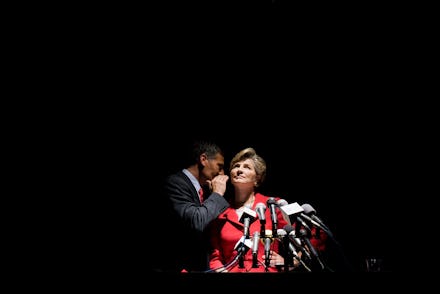Princeton Concludes What Kind of Government America Really Has, and It's Not a Democracy

The news: A scientific study from Princeton researcher Martin Gilens and Northwestern researcher Benjamin I. Page has finally put some science behind the recently popular argument that the United States isn't a democracy any more. And they've found that in fact, America is basically an oligarchy.
An oligarchy is a system where power is effectively wielded by a small number of individuals defined by their status called oligarchs. Members of the oligarchy are the rich, the well connected and the politically powerful, as well as particularly well placed individuals in institutions like banking and finance or the military.
For their study, Gilens and Page compiled data from roughly 1,800 different policy initiatives in the years between 1981 and 2002. They then compared those policy changes with the expressed opinion of the United State public. Comparing the preferences of the average American at the 50th percentile of income to what those Americans at the 90th percentile preferred, as well as the opinions of major lobbying or business groups, the researchers found out that the government followed the directives set forth by the latter two much more often.
It's beyond alarming. As Gilens and Page write, "the preferences of the average American appear to have only a minuscule, near-zero, statistically non-significant impact upon public policy." In other words, their statistics say your opinion literally does not matter.
That might explain why mandatory background checks on gun sales supported by 83% to 91% of Americans aren't in place, or why Congress has taken no action on greenhouse gas emissions even when such legislation is supported by the vast majority of citizens.
This problem has been steadily escalating for four decades. While there are some limitations to their data set, economists Thomas Piketty and Emmanuel Saez constructed income statistics based on IRS data that go back to 1913. They found that the gap between the ultra-wealthy and the rest of us is much bigger than you would think, as mapped by these graphs from the Center On Budget and Policy Priorities:
Piketty and Saez also calculated that as of September 2013 the top 1% of earners had captured 95% of all income gains since the Great Recession ended. The other 99% saw a net 12% drop to their income. So not only is oligarchy making the rich richer, it's driving policy that's made everyone else poorer.
What kind of oligarchy? As Gawker's Hamilton Nolan explains, Gilens and Page's findings provide support for two theories of governance: economic elite domination and biased pluralism. The first is pretty straightforward and states that the ultra-wealthy wield all the power in a given system, though some argue that this system still allows elites in corporations and the government to become powerful as well. Here, power does not necessarily derive from wealth, but those in power almost invariably come from the upper class. Biased pluralism on the other hand argues that the entire system is a mess and interest groups ruled by elites are fighting for dominance of the political process. Also, because of their vast wealth of resources, interest groups of large business tend to dominate a lot of the discourse.
In either case, the result is the same: Big corporations, the ultra-wealthy and special interests with a lot of money and power essentially make all of the decisions. Citizens wield little to no political power. America, the findings indicate, tends towards either of these much more than anything close to what we call "democracy" — systems such as majoritarian electoral democracy or majoritarian pluralism, under which the policy choices pursued by the government would reflect the opinions of the governed.
Nothing new: And no, this isn't a problem that's the result of any recent Supreme Court cases — at least certainly not the likes FEC v. Citizens United or FEC v. McCutcheon. The data is pretty clear that America has been sliding steadily into oligarchy for decades, mirrored in both the substantive effect on policy and in the distribution of wealth throughout the U.S. But cases like those might indicate the process is accelerating.
"Perhaps economic elites and interest group leaders enjoy greater policy expertise than the average citizen does," Gilens and Page write. "Perhaps they know better which policies will benefit everyone, and perhaps they seek the common good, rather than selfish ends, when deciding which policies to support.
"But we tend to doubt it."